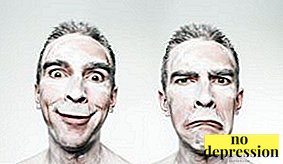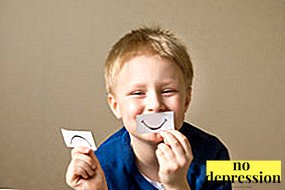In order to analyze the identity used list of negative traits person
This allows you to identify the characteristics of the individual, predict ways to interact with him and determine the methods for correcting unwanted behavior.
The classification of personal properties

The personality of the person is studied taking into account congenital and acquired qualities.
Under the mental properties understand sustainable phenomena that affect the activities and characterize a person from the psychological and social side.
Basic properties: temperament, character, direction, ability.
Temperament - a set of individual personality characteristics associated with dynamic aspects, type of nervous activity. It is the basis for the development of character.
For the first time the term was introduced by Hippocrates. Temperament was divided into 4 species. In our time, the turning point was the study by IP Pavlov of the types of the nervous system, of which four were also described.
Negative features of temperaments:
- choleric - agile, unbalanced, vindictive, impatient, impulsive, capable of showing aggression;
- sanguine person - hurried, hyperactive, impermanent, overestimates himself, suffers from mood swings;
- phlegamatik - badly reacts to external irritants, it is difficult to adapt, does not take the initiative, does not make contact with people;
- melancholic - indecisive, uncertain, pessimistic vulnerable, prone to depression.

Temperament - These are inborn personality traits.
Character - acquired features, permanent mental properties, defining features of the behavior of the individual and his relationship with people and the surrounding reality.
Orientation - a system of motives, motives, that is, what a person wants, to which he aspires, installations. Formed in the process of education, socially determined.
Abilities - personality traits, which are conditions for the successful implementation of a specific activity
Main personality traits
Personality is assessed in terms of the presence or absence of certain traits in it:
- Autonomy and independence - whether a person is able to act without relying on the opinions of other people.
Independence is a feature of a mature personality, it can be psychological, mental. An independent person calmly endures loneliness.
- Creative ability - this factor determines whether a person can create something new.
- Activity and purposefulness - the ability to act, to achieve, to realize their goals, the possession of willpower, the ability not to waste themselves on meaningless activities.
 Adequacy - a calm, wise attitude towards life and situations, the ability to act rationally.
Adequacy - a calm, wise attitude towards life and situations, the ability to act rationally.- Sense of humor - helps to cope with the troubles of life.
- Desire to develop - whether the person has the potential, the desire to move forward, or he is satisfied with the current state of affairs. If there is no development, then the reverse process is obtained - degradation.
- Ability to take responsibility first of all for yourself, your life and deeds.
- Self-respect, dignity - a person must understand his personal boundaries, be able to prevent negative people and situations in them, and at the same time respect other members of society.
Personality - this is the presence of individual character traits, but these are not just differences, but the presence of moral principles, as well as an acceptable way of interacting with the world.
Negative qualities of your character - test:
What are the negative traits of character?
The study of personality is inherent in the analysis of negative traits, their list is quite extensive, consider the most common ones:
 aggressiveness - a person actively protects himself, often provoking others to conflicts;
aggressiveness - a person actively protects himself, often provoking others to conflicts;- gambling - the desire to achieve the desired without taking risks. Often leads to situations that endanger life, health, financial well-being;
- apathy - temperament feature. The presence of this trait leads to the inability to achieve the goal, a person is indifferent to everything that happens to him;
- irresponsibility - the reluctance to make important decisions, the denial of responsibility for their actions, the denial of awareness of the consequences of what has been done;
- ruthlessness - lack of sympathy for others, inability to condole, inhuman actions, with pathology leading to the death of living beings;
- lust for power - the desire to control all the people with whom the person interacts, to subordinate to his will;
- suggestibility - easily obeys behavior imposed from the outside, while not evaluating the result of their actions. However, too low suggestibility can cause poor learning;
- stupidity - the inability to make logical conclusions even from the simplest situations, the lack of sound criticism;
- rudeness - unwillingness to adhere to polite behavior, adopted in society, deliberate expression of negative, provoking scandal;
- greed - can manifest itself in pathological hoarding, unwillingness to share things or finances even with close people;
 cruelty - causing pain, discomfort to people, animals for personal satisfaction. Impact may be psychological, emotional, physical;
cruelty - causing pain, discomfort to people, animals for personal satisfaction. Impact may be psychological, emotional, physical;- addiction - obtaining benefits, pleasure from the effects of substances, interaction with certain people, situations, can harm physical and emotional health, financial well-being;
- envy - the propensity to compare their values and the values of other people and to experience negative emotions, experiences, the desire to have something, like others, about this;
- spoiled - the desire to get what you want without taking into account the possibilities, circumstances, here and now;
- laziness - lack of desire to do something, to strain, move, think;
- deceit - characterized by a conscious desire to create in others the wrong impression of facts and events to extract personal benefits;
- hypocrisy - pretense, assurances in a good disposition, love, friendship, but at the same time think differently;
- vindictiveness - the desire to do something in retaliation, the tendency to focus on conflicts, to delay them, to punish offenders;
- narcissism - praising yourself, your virtues, actions, scorn in relations with other people;
 touchiness - reaction to situations that do not meet expectations, the view that the world should revolve around them, and people will certainly fulfill desires, act accordingly;
touchiness - reaction to situations that do not meet expectations, the view that the world should revolve around them, and people will certainly fulfill desires, act accordingly;- irritability - excessive manifestation of emotions, the strength of which does not correspond to the situation. May be caused by external factors or internal;
- cowardice - the inability to resist, the desire to care, escape from people and situations, the presence of various fears;
- selfishness - the desire to disregard the opinions of other people, to live for the sake of their comfort.
Negative traits of a person's character - a list.
Examples for summary
Study of character traits used when applying for a job. This allows you to predict the ability to adapt to the team, to achieve success, to work for the company.
Such a feature as deceit, is a factor by which it can be assumed that a person cannot be trusted responsible and secret tasks. Such people easily dissolve gossip, provoke conflicts, go to the betrayal, theft.
Intransigence is an obstacle to coordinated teamwork. Cowardice is not permissible at hazardous facilities, for work in law enforcement.
If a person has addiction, it means that he has a reduced responsibility to society, at the same time with this feature there is often a tendency to lie.

The resume is often asked to indicate the positive and negative aspects of the character.
But the man himself is unlikely to reveal his negative sides. In the application form, applicants indicate the features that can not significantly affect the opinion of them.
For example, it could be:
- straightness;
- unprincipled;
- workaholism;
- risk appetite;
- excessive emotionality;
- slowness;
- pedantry;
- fear of air travel.
Some characteristics, despite their negative coloration, may nevertheless favor work.
For example, workaholism will say that a person pays full attention to the chosen activity and can work overtime, pedantry - that he will carefully approach the work, and lust for leadership positions, but with the reservation on the ability to properly manage their status not to the detriment of others.
Evaluation of negative qualities in the resume is in terms of how they can affect the work, communication with the team.
Where it is not necessary to contact other people, shyness will not interfere with activities. If the work is associated with constant communication, then excessive sociability will be even a plus.
What to say, if at the interview you were asked to name your weaknesses:
Is it true that a bad character can be corrected if you wish?

Character is acquired properties based on temperament.
In many ways, it is formed by the effects of water education, social environment, stressful situations. It manifests itself in childhood.
With the wrong approach negative traits are enhanced. If a child lives in harsh conditions, under constant moral and physical pressure, then almost certainly he will have various phobias, insecurity, aggressiveness.
Since a character is a property of a person acquired, it can be corrected. However, given the fact that a person becomes accustomed to behave in a certain way, the older he is, the more difficult it is to engage in correction.
In addition to the presence of negative character traits, it is important to take into account the properties of temperament, sometimes the characteristics of the nervous system are such that to change something almost impossible.
How to deal with their bad qualities?
First of all, man he himself must realize that he has negative traits.
He must understand that his actions negatively affect relations with people around him, his career growth, and personal peace of mind.
Identify the presence of various features by using psychological tests or personal observation and sense of self. Next comes the work of self-control..
What to do:
 Learn to stop yourself. If you feel anger, irritation, take a deep breath, give yourself time to think - is it worth it.
Learn to stop yourself. If you feel anger, irritation, take a deep breath, give yourself time to think - is it worth it.- Control your mental process will help meditations.
- If you have a desire to criticize others, then try to look at them from the other side - after all, everyone has positive sides. In addition, you yourself are imperfect.
- Excessive shyness, insecurity themselves will not pass. Communicative skills can be developed only by practice, that is, learning to communicate, engage in dialogues, not shun people, and seek the opportunity to contact them.
- Decide for yourself what qualities you want to possess.. First of all, develop the positive aspects of character, but do not persevere with the negative ones.
Negative aspects of personality - part of personality. No one person can be perfect, so you should not strive for perfection and demand it from others.
The main thing is the balance in the psyche of positive and negative qualities so that the latter do not interfere with living, working, and building relationships.
A person educates himself, so if you know that you have negative character traits, you able to deal with them. And the first thing to be raised is willpower.
How to change your character? Find out from the video:

 Adequacy - a calm, wise attitude towards life and situations, the ability to act rationally.
Adequacy - a calm, wise attitude towards life and situations, the ability to act rationally. aggressiveness - a person actively protects himself, often provoking others to conflicts;
aggressiveness - a person actively protects himself, often provoking others to conflicts; cruelty - causing pain, discomfort to people, animals for personal satisfaction. Impact may be psychological, emotional, physical;
cruelty - causing pain, discomfort to people, animals for personal satisfaction. Impact may be psychological, emotional, physical; touchiness - reaction to situations that do not meet expectations, the view that the world should revolve around them, and people will certainly fulfill desires, act accordingly;
touchiness - reaction to situations that do not meet expectations, the view that the world should revolve around them, and people will certainly fulfill desires, act accordingly; Learn to stop yourself. If you feel anger, irritation, take a deep breath, give yourself time to think - is it worth it.
Learn to stop yourself. If you feel anger, irritation, take a deep breath, give yourself time to think - is it worth it.

